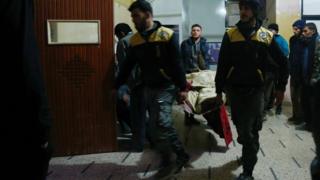Syria war: Hospitals being targeted, aid workers say
At least 10 hospitals in rebel-held areas of Syria have suffered direct air or artillery attacks over the past 10 days, aid workers say.
An adviser to a coalition of medical charities told the BBC that the attacks had been the most intense for a year.
A senior UN official also told the BBC that health facilities in Syria had been hit "yet again".
Meanwhile, 17 civilians died in air raids in Eastern Ghouta, near Damascus, on Saturday, a monitor said.
The most deadly raid was in Hammuriyeh where 12 people, including two children, died, the UK-based Syrian Observatory for Human Rights said.
Last week, at least 25 civilians were reported killed in air strikes on two towns in rebel-held Eastern Ghouta. About 400,000 people there have been under siege by Russian-backed Syrian government forces since 2013.
- Urgent transfer of sick Syrians ends
- Why is there a war in Syria?
The Syrian government and Russia military have consistently denied targeting civilian areas.
Aid agencies said medical centres hit by recent air strikes included a maternity hospital in Maarrat al-Numan, in Idlib province, which was reportedly hit three times in four days.
Five people died in the worst attack, on Wednesday, according to the Syrian American Medical Society (Sams), and the hospital was temporarily put out of service.
Hamish de Bretton-Gordon, who advises the Union of Medical Care and Relief Organizations (UOSSM), said other attacks in recent days had targeted hospitals predominantly in Eastern Ghouta, on the outskirts of the capital.
"This has been at a level, again, we haven't seen," he said.
 Media playback is unsupported on your device
Media playback is unsupported on your deviceMr De Bretton-Gordon said many children in Eastern Ghouta needed medical evacuation.
"There are over 125 children needing live-saving surgery, including three very young children [whose injuries are] too graphic almost to describe," he said.
"A six-month old who has lost an eye who will die if he doesn't receive surgery and an eight-year old girl who weighs only 8kg [17lb] who is dying of malnutrition."
The UN's Humanitarian Co-ordinator for Syria, Jan Egeland, also told the BBC that several of the remaining health facilities in the Eastern Ghouta had been hit "yet again".
"This war is continuing as bad in 2018 as it ended in 2017," he said.
Other attacks on medical facilities documented by UOSSM include:
- An air strike on a health centre in Harasta, Eastern Ghouta, on 31 December that injured two nurses and damaged the building
- A paramedic was killed when an artillery shell struck a hospital in Harasta on 30 December
- A barrel bomb attack in Maarrat al-Numan, Idlib, on 28 December killed a woman and injured three children at a primary health care centre
UOSSM chairman Dr Ghanem Tayara condemned the attacks.
"This fresh wave of attacks on medical facilities is sickening and unacceptable," he said in a statement.
"These attacks force facilities to shut down, terrorise staff and result in undue hardship for patients already suffering."
He added: "Since the beginning of the crisis, there have been hundreds of well-documented attacks on medical facilities in Syria. It's shameful that there has never been a formal prosecution for these war crimes and it severely undermines the UN's credibility."
The Syrian government recently allowed Red Cross teams to evacuate 29 critically-ill patients from the Eastern Ghouta as part of a deal that saw rebels release the same number of prisoners.
However, hundreds more patients are in urgent need of evacuation from the enclave.
The Eastern Ghouta is designated a "de-escalation zone" by Russia and Iran, the government's other main ally, along with Turkey, which backs the rebels.
But hostilities intensified in mid-November when the Syrian military stepped up air and artillery attacks on the enclave in response to a rebel offensive.

